
Find Help
More Items From Ergsy search
-

What causes sunburn?
Relevance: 100%
-

Can sunburns cause permanent damage?
Relevance: 92%
-

What is Sunburn?
Relevance: 80%
-

What is sunburn?
Relevance: 79%
-

What are the symptoms of sunburn?
Relevance: 77%
-
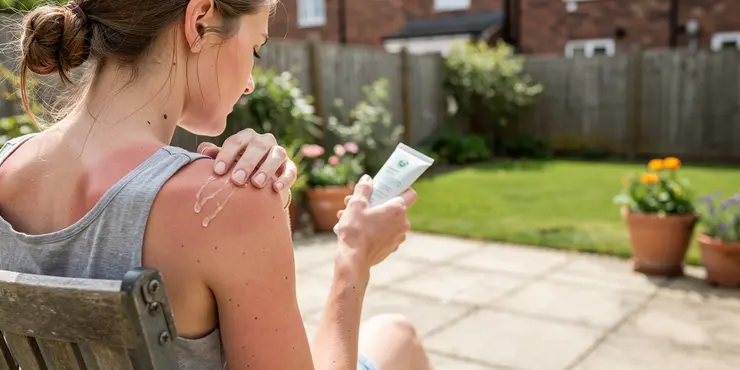
Self care - sunburn
Relevance: 75%
-

Self care - sunburn
Relevance: 74%
-
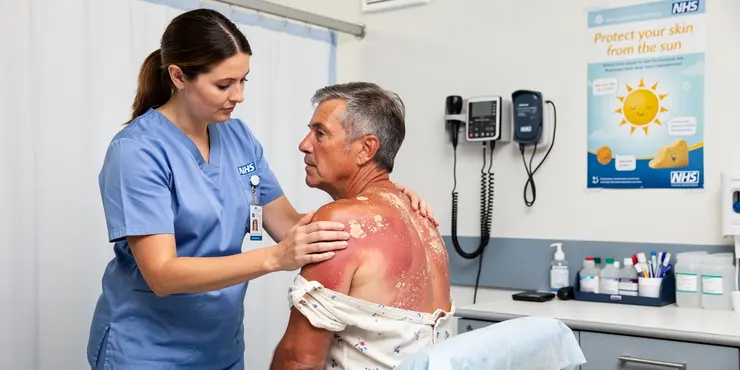
Can sunburn turn into a tan?
Relevance: 73%
-

Can sunburn be prevented?
Relevance: 72%
-

How is sunburn treated?
Relevance: 72%
-
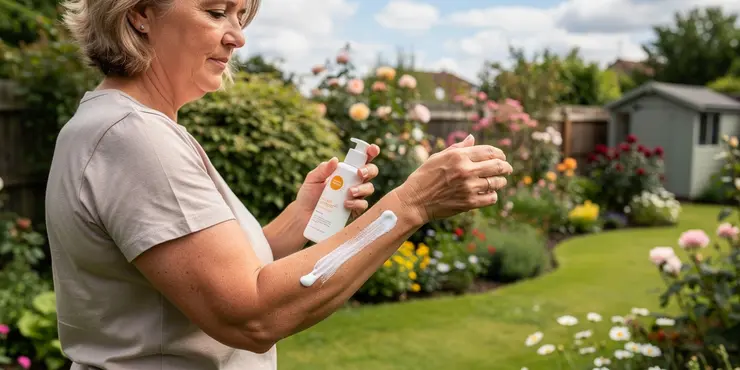
What are the long-term effects of sunburn?
Relevance: 71%
-
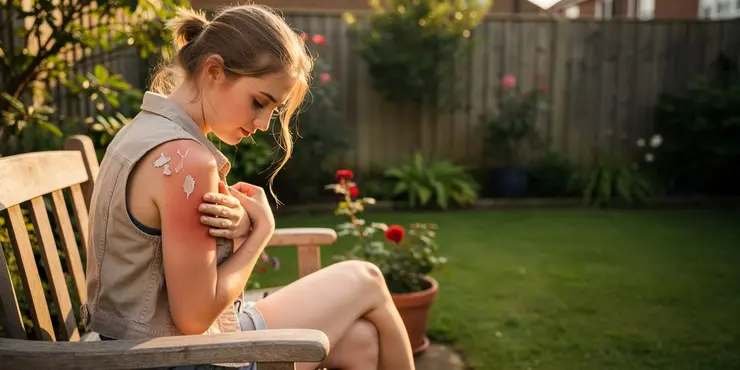
Is peeling a normal part of sunburn recovery?
Relevance: 68%
-

Does tanning lotion prevent sunburn?
Relevance: 66%
-
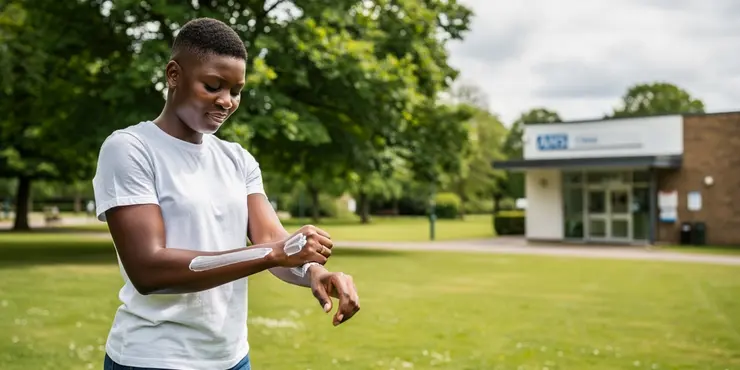
Can dark-skinned individuals get sunburned?
Relevance: 65%
-

Are some people more prone to sunburn?
Relevance: 65%
-
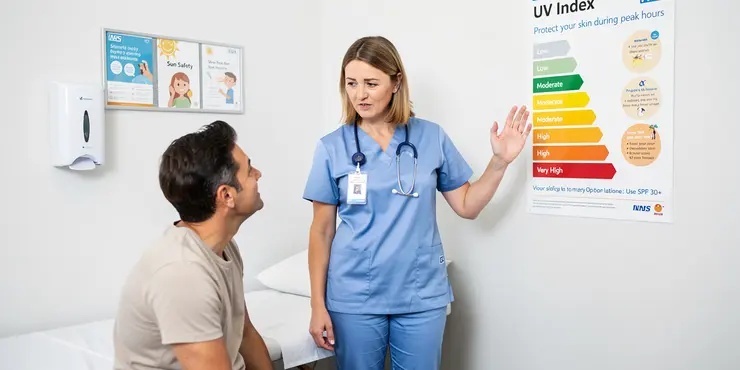
At what time of day is the sunburn risk highest?
Relevance: 64%
-

How long does it take for sunburn to appear?
Relevance: 63%
-

What SPF level is recommended to prevent sunburn?
Relevance: 57%
-
Does tanning on sunbeds reduce the risk of future sunburns?
Relevance: 57%
-
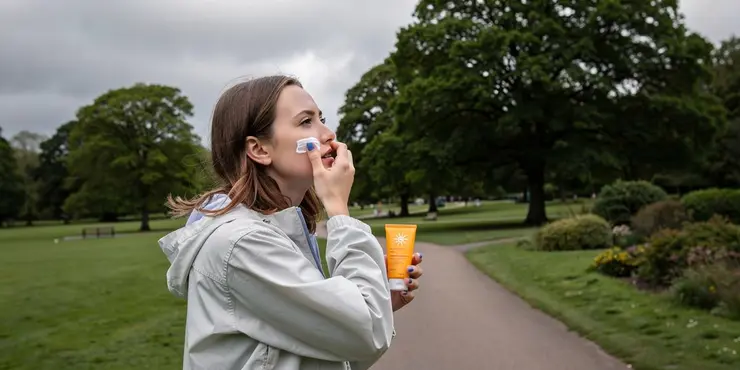
Is it possible to get sunburned on cloudy days?
Relevance: 46%
-

What causes psoriasis?
Relevance: 43%
-

Does water reflect UV rays, increasing the risk of sunburn?
Relevance: 40%
-

What to do if you're sunburnt
Relevance: 38%
-

Causes of a sore throat
Relevance: 32%
-

What causes shingles?
Relevance: 32%
-

What causes hypotony?
Relevance: 32%
-
What causes tinnitus?
Relevance: 32%
-

What causes autism?
Relevance: 32%
-

What causes shingles?
Relevance: 32%
-

BSL - Causes of insomnia
Relevance: 32%
-

What causes appendicitis?
Relevance: 32%
-

What causes asthma?
Relevance: 31%
-

What causes BPH?
Relevance: 31%
-

What causes eczema?
Relevance: 31%
-

What causes thrombosis?
Relevance: 31%
-

What causes ADHD?
Relevance: 31%
-

Why do some people not burn as easily as others?
Relevance: 31%
-

What causes obesity?
Relevance: 31%
-

What causes SAD?
Relevance: 31%
-

Causes of coeliac disease
Relevance: 30%
What is Sunburn?
Sunburn is a form of skin damage caused by excessive exposure to ultraviolet (UV) rays, primarily from the sun. It manifests as red, inflamed skin that is hot to the touch, and in more severe cases, it can lead to blistering and peeling. While it's a common condition, sunburn can cause significant discomfort and long-term skin damage, including an increased risk of skin cancer.
Causes of Sunburn
The primary cause of sunburn is UV radiation emitted by the sun. There are two main types of UV rays that affect the skin: UVA and UVB. UVB rays are primarily responsible for causing sunburn as they directly damage the DNA in skin cells, leading to inflammation and the classic symptoms of sunburn. UVA rays, on the other hand, penetrate more deeply into the skin and contribute to premature ageing and long-term damage such as wrinkles.
Risk Factors
Certain factors can increase the risk of developing sunburn. These include having fair skin, which contains less melanin—a pigment that offers some protection against UV radiation. People with freckles or red hair are particularly susceptible. The risk is also higher during summer months and in places closer to the equator, where the sun's rays are more direct and intense. Additionally, being at high altitudes, where the atmosphere is thinner, increases UV exposure.
Weather Conditions
Even on cloudy days, up to 80% of UV rays can penetrate the clouds and reach the skin, making it possible to get sunburnt without visible sunlight. Reflective surfaces such as water, snow, and sand can also intensify UV exposure by reflecting sunlight onto the skin.
Prevention Tips
To prevent sunburn, it's important to limit exposure to the sun, especially between 11 a.m. and 3 p.m., when UV rays are strongest. Wearing protective clothing, such as long-sleeved shirts and wide-brimmed hats, and using sunglasses with UV protection can help shield the skin and eyes. Applying broad-spectrum sunscreen with a high SPF factor regularly is crucial, especially after swimming or sweating. Reapply every two hours, even on cloudy days.
Conclusion
Understanding the causes of sunburn and the factors that increase risk can aid in preventing this common condition. By taking proactive measures to protect the skin from excessive UV exposure, individuals can enjoy time outdoors while minimising the risk of painful sunburn and potential long-term skin damage. Awareness and prevention are key to maintaining skin health and reducing the risk of complications associated with sunburn.
Frequently Asked Questions
What causes sunburn?
Sunburn is caused by overexposure to ultraviolet (UV) radiation from the sun or artificial sources like tanning beds.
Which UV rays contribute to sunburn?
Both UVA and UVB rays can contribute to sunburn, with UVB being the primary cause of sunburn.
How does UV radiation damage the skin?
UV radiation damages the DNA in skin cells, triggering an inflammatory response and leading to sunburn.
Can you get sunburned on a cloudy day?
Yes, up to 80% of UV rays can penetrate clouds, leading to sunburn even on overcast days.
What skin types are more prone to sunburn?
People with fair skin, light eyes, and light hair are more prone to sunburn due to less melanin in their skin.
Does water influence sunburn risk?
Yes, water can reflect UV rays, increasing the risk of sunburn while swimming or near water.
Can you get sunburned through glass?
Most glass blocks UVB rays but allows some UVA rays to pass through, which can contribute to skin damage.
How does altitude affect sunburn risk?
At higher altitudes, UV radiation is more intense, increasing the risk of sunburn.
Does snow affect sunburn risk?
Yes, snow reflects up to 80% of UV radiation, increasing the likelihood of sunburn in snowy conditions.
What role does ozone play in sunburn risk?
The ozone layer absorbs and blocks some UV radiation; depletion can increase sunburn risk.
Can medications affect sunburn susceptibility?
Certain medications can increase photosensitivity, making the skin more susceptible to sunburn.
Does time of day influence sunburn risk?
Yes, UV radiation is strongest between 10 a.m. and 4 p.m., increasing the risk of sunburn.
Can reflective surfaces increase sunburn risk?
Reflective surfaces like sand, water, and concrete can reflect UV rays, increasing sunburn risk.
How does skin pigmentation affect sunburn?
Darker skin has more melanin, providing some protection against UV radiation, but can still get sunburned.
Is artificial UV light harmful?
Yes, tanning beds and lamps emit UV radiation that can cause sunburn and increase skin cancer risk.
How does sunscreen help prevent sunburn?
Sunscreen absorbs or reflects UV rays, reducing the amount that penetrates the skin and preventing sunburn.
Can clothing prevent sunburn?
Yes, tightly woven fabrics and clothing with a high UPF (ultraviolet protection factor) can block UV rays.
How does skin damage occur at the cellular level?
UV rays cause direct DNA damage in skin cells, which can lead to cell death and inflammation, resulting in sunburn.
Can previous sunburns increase future skin damage risk?
Yes, repeated sunburns can lead to long-term skin damage and increase the risk of skin cancer.
How quickly can sunburn occur?
Sunburn can occur in as little as 15 minutes of UV exposure, though it might not appear until several hours later.
Useful Links
This website offers general information and is not a substitute for professional advice.
Always seek guidance from qualified professionals.
If you have any medical concerns or need urgent help, contact a healthcare professional or emergency services immediately.
Some of this content was generated with AI assistance. We’ve done our best to keep it accurate, helpful, and human-friendly.
- Ergsy carfully checks the information in the videos we provide here.
- Videos shown by Youtube after a video has completed, have NOT been reviewed by ERGSY.
- To view, click the arrow in centre of video.
- Most of the videos you find here will have subtitles and/or closed captions available.
- You may need to turn these on, and choose your preferred language.
- Go to the video you'd like to watch.
- If closed captions (CC) are available, settings will be visible on the bottom right of the video player.
- To turn on Captions, click settings .
- To turn off Captions, click settings again.
More Items From Ergsy search
-

What causes sunburn?
Relevance: 100%
-

Can sunburns cause permanent damage?
Relevance: 92%
-

What is Sunburn?
Relevance: 80%
-

What is sunburn?
Relevance: 79%
-

What are the symptoms of sunburn?
Relevance: 77%
-

Self care - sunburn
Relevance: 75%
-

Self care - sunburn
Relevance: 74%
-

Can sunburn turn into a tan?
Relevance: 73%
-

Can sunburn be prevented?
Relevance: 72%
-

How is sunburn treated?
Relevance: 72%
-

What are the long-term effects of sunburn?
Relevance: 71%
-

Is peeling a normal part of sunburn recovery?
Relevance: 68%
-

Does tanning lotion prevent sunburn?
Relevance: 66%
-

Can dark-skinned individuals get sunburned?
Relevance: 65%
-

Are some people more prone to sunburn?
Relevance: 65%
-

At what time of day is the sunburn risk highest?
Relevance: 64%
-

How long does it take for sunburn to appear?
Relevance: 63%
-

What SPF level is recommended to prevent sunburn?
Relevance: 57%
-
Does tanning on sunbeds reduce the risk of future sunburns?
Relevance: 57%
-

Is it possible to get sunburned on cloudy days?
Relevance: 46%
-

What causes psoriasis?
Relevance: 43%
-

Does water reflect UV rays, increasing the risk of sunburn?
Relevance: 40%
-

What to do if you're sunburnt
Relevance: 38%
-

Causes of a sore throat
Relevance: 32%
-

What causes shingles?
Relevance: 32%
-

What causes hypotony?
Relevance: 32%
-
What causes tinnitus?
Relevance: 32%
-

What causes autism?
Relevance: 32%
-

What causes shingles?
Relevance: 32%
-

BSL - Causes of insomnia
Relevance: 32%
-

What causes appendicitis?
Relevance: 32%
-

What causes asthma?
Relevance: 31%
-

What causes BPH?
Relevance: 31%
-

What causes eczema?
Relevance: 31%
-

What causes thrombosis?
Relevance: 31%
-

What causes ADHD?
Relevance: 31%
-

Why do some people not burn as easily as others?
Relevance: 31%
-

What causes obesity?
Relevance: 31%
-

What causes SAD?
Relevance: 31%
-

Causes of coeliac disease
Relevance: 30%


